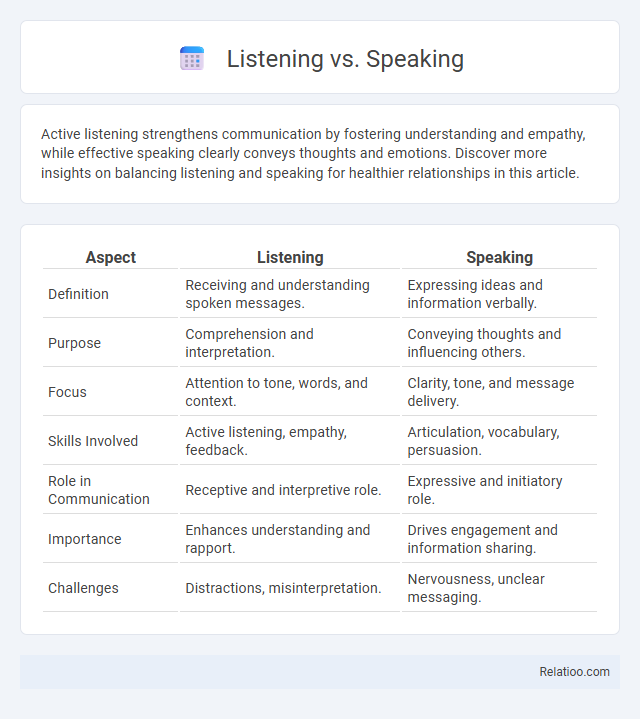Active listening strengthens communication by fostering understanding and empathy, while effective speaking clearly conveys thoughts and emotions. Discover more insights on balancing listening and speaking for healthier relationships in this article.
Table of Comparison
| Aspect | Listening | Speaking |
|---|---|---|
| Definition | Receiving and understanding spoken messages. | Expressing ideas and information verbally. |
| Purpose | Comprehension and interpretation. | Conveying thoughts and influencing others. |
| Focus | Attention to tone, words, and context. | Clarity, tone, and message delivery. |
| Skills Involved | Active listening, empathy, feedback. | Articulation, vocabulary, persuasion. |
| Role in Communication | Receptive and interpretive role. | Expressive and initiatory role. |
| Importance | Enhances understanding and rapport. | Drives engagement and information sharing. |
| Challenges | Distractions, misinterpretation. | Nervousness, unclear messaging. |
Understanding Listening and Speaking
Listening and speaking are essential communication skills that contribute to effective trust-building in relationships. Active listening involves fully concentrating, understanding, and responding thoughtfully to the speaker, which fosters clarity and empathy. Clear and confident speaking conveys intentions and emotions accurately, reinforcing mutual understanding and strengthening trust between parties.
Key Differences Between Listening and Speaking
Listening involves actively receiving and interpreting verbal and non-verbal cues to understand the speaker's message, while speaking is the process of expressing thoughts, ideas, and emotions verbally. Effective listening fosters trust-building by demonstrating empathy and validation, whereas speaking focuses on conveying information or influencing others. The key difference lies in listening prioritizing comprehension and connection, and speaking emphasizing expression and persuasion.
The Importance of Listening Skills
Effective listening skills are crucial for trust-building in any communication, as they enable individuals to fully understand and respond to others' needs and concerns. Research shows that people who feel genuinely heard are more likely to develop trust and openness, fostering stronger relationships both personally and professionally. Prioritizing active listening enhances collaboration and reduces misunderstandings, making it a fundamental element in successful speaking engagements and leadership.
The Role of Speaking in Communication
Speaking plays a crucial role in communication by allowing you to express ideas, emotions, and intentions clearly and persuasively. It complements listening by providing feedback, clarifying misunderstandings, and reinforcing trust through tone and confidence. Effective speaking skills help build rapport and credibility, laying a foundation for stronger interpersonal relationships and trust-building.
Barriers to Effective Listening
Barriers to effective listening include distractions, prejudgments, and emotional biases that hinder true understanding and trust-building. Poor listening can lead to miscommunication and damage Your relationships by eroding trust and reducing the effectiveness of spoken interactions. Overcoming these obstacles is essential for enhancing speaking skills and fostering a deeper connection in personal and professional settings.
Strategies to Improve Speaking Skills
Effective strategies to improve speaking skills include practicing active listening to understand context and respond appropriately, which enhances communication clarity and engagement. Using repetition and role-playing exercises helps build confidence and fluency in various conversational scenarios while expanding vocabulary and pronunciation accuracy. Incorporating feedback from peers and mentors fosters trust-building by demonstrating openness to improvement and strengthening interpersonal connections.
Active Listening Techniques
Active listening techniques such as paraphrasing, maintaining eye contact, and providing feedback enhance communication by ensuring the speaker feels heard and understood. These methods foster trust-building by demonstrating genuine interest and empathy, which strengthens interpersonal relationships and encourages open dialogue. Emphasizing listening over speaking helps create a foundation of trust, crucial for effective collaboration and conflict resolution.
Balancing Listening and Speaking in Conversations
Balancing listening and speaking in conversations enhances trust-building by fostering mutual understanding and respect. Effective communication requires active listening to accurately interpret messages while expressing thoughts clearly to maintain engagement. Prioritizing this balance strengthens relationships and creates a foundation of credibility and reliability.
Impact on Relationships and Collaboration
Effective listening enhances understanding and empathy, creating a strong foundation for meaningful communication. Speaking clearly and confidently conveys ideas and intentions, promoting transparency and reducing misunderstandings. Trust-building, nurtured by consistent listening and honest speaking, strengthens relationships and fosters seamless collaboration within teams.
Developing Both Skills for Success
Effective communication requires balancing listening and speaking skills to foster trust-building in personal and professional relationships. Developing active listening enhances understanding and empathy, while clear, confident speaking conveys ideas and intentions effectively. Building trust relies on consistent, authentic exchanges supported by these complementary communication abilities.

Infographic: Listening vs Speaking
 relatioo.com
relatioo.com